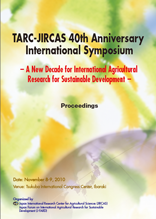Closing Remarks

Good evening, everybody. My name is Koji Tanaka, from Kyoto University. I am assigned as
Vice President of J-FARD which was the focal topic in the Panel Discussion. Then, I am very pleased
to be here to give the Closing Remarks on behalf of J-FARD. But, originally, the President of J-FARD,
Mr. Azuma, was scheduled to be here, but due to his sudden official duties abroad, it became
impossible for him to attend this symposium. That is why I am here to close this symposium instead. I
am also very pleased to be here to celebrate the 40th Anniversary of JIRCAS, and make the Closing
Remarks for the 40th anniversary celebration.
First of all, as one of the co-organizers, I have to express sincere gratitude to all the
participants in this symposium for your very generous and enthusiastic participation, to all the
speakers as well as panelists in this symposium, who activated the discussions of the symposium.
Lastly, I have to thank the J-FARD members for their generous efforts to organize and manage this
very fruitful symposium.
Yesterday, in the first session of this symposium, Dr. Koyama of JIRCAS very briefly
summarized and introduced the history of JIRCAS or JIRCAS development within the last decades.
According to his presentation and my understanding, the research activities by JIRCAS seem to have
developed and have been organized and conducted following three stages of research approaches or
research development. In other words, the last four decades can be divided into three stages. First, proproduction
of pro-productivity research approach period in the 1960s and 1970s. Second, the system
research approach periods in the late 1970s and 1980s. And the third, comprehensive research
approach periods in 1990s and onwards, reflecting trends of international research activities
concerning agricultural and rural development. And, I think JIRCAS has played very important roles
in some of the international agricultural researches as well as international collaboration and
cooperation to promote agriculture and to improve the well-being of people in developing countries.
As this historical process indicates, JIRCAS has successfully developed its research functions
and organizational structure, so that JIRCAS has made good in challenges posed by various issues and
problems arising during the last forty years. In that sense, JIRCAS has been very successful in
promoting research activities and also develop collaboration with the international agencies as a
representative of research institutions in Japan. I think the only one institution who represents
presence of agricultural research in Japan is JIRCAS. In that sense, I would like to celebrate the 40th
anniversary again from the bottom of my heart. In this symposium, we could exchange opinions and
views, and could develop discussions on how to create and develop collaborative networks among
research institutions including universities at various levels and at national and international levels.
Also, we could learn through the vital discussions at the Panel Discussion for example on how
important and how difficult it is to create and organize more effective and collaborate mechanisms
combining institutions at various levels as well as by individual researchers. And then, we also learn
that it is very necessary for any agricultural research institutions to redefine some issues to tackle. For
example, we have discussed global public goods, and then following the discussion, not only JIRCAS
but also we, all the agricultural researchers need to redefine what should be done through institutional
and individual efforts. Needless to say, JIRCAS is not an exception from various issues. I think or I
hope for the coming ten years, JIRCAS will make big efforts to expand and also to strengthen more
effective collaboration and also more sustainable linkages with local institutions as well as
international institutions. And I believe JIRCAS has the powers to make stronger linkages among
these institutions, including universities.
Anyhow, time has already run out, so I have to close this symposium. I would like to remind
all of you that this symposium was organized to celebrate the 40th anniversary of JIRCAS, and then I
would like to congratulate again, And also, I would like to close this symposium by saying or by expressing my hope or expectation that JIRCAS will be able to celebrate its successful achievement to
be obtained within the next ten years--- that is the 50th Golden Anniversary of JIRCAS to be
celebrated 10 years later. Thank you very much.
| Date of issued | |
|---|---|
| Creator | Koji Tanaka |
| Publisher | Japan International Research Center for Agricultural Sciences |
| Available Online | |
| Issue | 2010 |
| spage | 131 |
| epage | 132 |
| Rights | Japan International Research Center for Agricultural Sciences |
| Language | eng |
